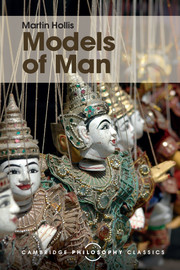Preface to this edition
Published online by Cambridge University Press: 05 November 2015
Summary
In Britain and elsewhere in the 1960s and 1970s the social sciences were unsettled. There were deep disagreements about what they were and were for, and about what kinds of truth and understanding they might produce. Philosophers of mind, language, action, morals and science were impelled to intervene and engage. Martin Hollis was one of the most distinguished and wide-ranging to do so, and one of the most prolific.
Hollis fought on two fronts. One was against the presumption that humans were part of the natural world and exhaustively subject to causal laws of nature. The other was against an anti-foundational philosophy that licensed cognitive and moral ‘relativisms’. He deployed his arguments in collaborative ventures with a range of practising social scientists and defended them in three pointedly philosophical books of his own. In the second of these, The Cunning of Reason (1987), he argued that game-theoretic models and theories of ‘rational choice’ allow no room for the rational actor as he or she distinctively (reflectively) is. In the third, Trust within Reason (1998), he asked how one could reasonably expect individuals to enter relations of trust from which, as individuals, they would not obviously gain. It was in Models of Man, the first of the three, that he laid out his grounds.
These were firmly rationalistic. Actors, he insists, are not caused to act. They do so for reasons that inform their motives and define their intentions. These reasons are given by the rules in the ‘roles’ they have and are refined by the skill and judgement with which they read the rules in their own best interests. If they succeed, their actions are distinctively theirs. And in being as rational as can be, these explain themselves. Causal stories need only to be invoked to explain how actors find themselves in the circumstances they do, or deviate from reason, or produce consequences they could not have foreseen.
- Type
- Chapter
- Information
- Models of ManPhilosophical Thoughts on Social Action, pp. vii - viiiPublisher: Cambridge University PressPrint publication year: 2015

